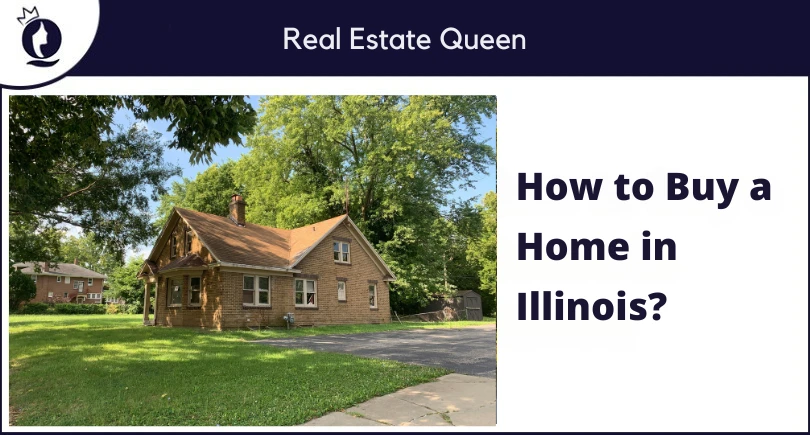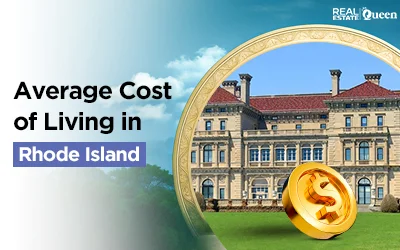
The Illinois housing market presents a unique opportunity for homebuyers. The average home price in Illinois is around $312,900 with an increase of 7.7% Y.O.Y. Inventory remains tight at 2.5 months supply, and homes spend an average of 43 days on the market.
This guide will walk you through the complete home-buying process in Illinois with a focus on state-specific steps, challenges, and opportunities to help you navigate the local market successfully.
Key Takeaways
- Step 1: Assess your finances & credit health for mortgage readiness.
- Step 2: Get pre-approved for a mortgage to strengthen offers
- Step 3: Hire a licensed Illinois real estate agent for local expertise
- Step 4: Search homes and make competitive offers with contingencies
- Step 5 Conduct thorough due diligence including Illinois-specific inspections
- Step 6 Conduct thorough due diligence including Illinois-specific inspections.
- Step 7 Finalize financing, handle insurance, and prepare for closing costs.
- Step 8 Close smoothly and leverage Illinois homeowner benefits.
Current Illinois Housing Market Overview (2025)
The Illinois housing market is active in 2025. Homes sell in 43 days with a 2.5-month supply. Median prices are $312,900, up 7.7% YOY. Chicago leads at $350,000/38 days, while Springfield, Peoria, and Rockford are slower and more affordable.
How to Buy a House in Illinois: 7 Steps
Step 1: Figure Out Your Finances
- How Much House Can You Afford?
Illinois has an effective property tax rate of 2.31%, higher than many states, which impacts affordability. Budget also for typical HOA fees ($150-$400/month) and homeowner’s insurance. - Get Your Down Payment Ready.
Aim to save between 5%-20% of the purchase price. Illinois offers first-time homebuyer programs like IHDA Access Forgivable, Deferred, and Repayable Mortgages, plus local grants in Chicago, Aurora, Kane County, and Springfield. - Get Pre-Approved for a Mortgage
Average 30-year fixed rates in Illinois are currently around 6.50%, and 15-year rates at 5.57%. Pre-approval strengthens your offer versus pre-qualification.
Step 2: Find Your Dream Home in Illinois
Set your budget to find your Illinois home faster. Use Houzeo to browse listings, save favorites, book showings, and make offers online. Balance features with costs—Chicago homes are far pricier than Rockford or Peoria.
Whether you are looking for homes for sale in Chicago, Rockford, or Peoria, the best place to buy in Illinois depends on your priorities:
Sangamon County: Known for its affordability and steady value retention, it offers a slower-paced lifestyle with access to good schools and government jobs.
Cook County: Offers diverse economic opportunities, extensive cultural amenities, and urban living.
Define Your Needs vs. Wants
Consider commute, schools, amenities, flood zones, and sustainability. Insurance costs are moderate—about $2,100 in Chicago vs. $1,200 in Springfield. Affordable options include Peoria, Rockford, and Springfield, while Chicago appeals to buyers seeking jobs and cultural amenities.
Step 3: Make an Offer That Wins
Illinois buyers typically submit earnest money deposits of 1%-3% of the purchase price. Due to current competitive conditions, having pre-approval, reasonable contingencies (financing, inspection), and a clean offer package improves chances.
Key Components of a Strong Illinois Offer:
- Fair Market Price:
- Earnest Money Deposit:
- Essential Contingencies to Protect Your Investment: Financing Contingency
Financing Contingency
A financing contingency lets you cancel the contract if your loan is denied, protecting your earnest money. With Illinois mortgage rates near 6.50% for a 30-year fixed, it’s a key safeguard against financing risks in today’s market.
Appraisal Contingency
Including these contingencies and basing your offer on localized market data enhances your chance of success in Illinois while protecting your investment in an evolving market.
Appraisal Contingency in Illinois
An appraisal contingency lets you renegotiate or cancel if the home appraises below your offer, protecting your earnest money. With Illinois home prices up 7.7% year-over-year, it safeguards buyers from overpaying in a fast-changing market.
Step 4: The Crucial Due Diligence Period
Expect inspection contingencies within a typical 7-10 day period. Illinois-specific inspections often include radon (due to high local risk), termite, mold, and sewer inspections.
- General Home Inspection: A thorough review of the home’s structural integrity, roofing, electrical systems, plumbing, and HVAC. Typically lasts 2-4 hours.
- Radon Inspection: Illinois is a high radon risk area, so testing and mitigation (if needed) are standard parts of due diligence.
- Termite/Pest Inspection: Common to assess for wood-destroying insects.
- Mold Inspection: Recommended if there is any indication of moisture issues or health concerns.
- Sewer Inspection: Evaluates the condition of sewer lines, especially important in older Illinois homes.
Step 5: Secure Your Financing and Insurance
Finalize your mortgage underwriting (typically 5-7 days after appraisal). Homeowner’s insurance in Illinois is standard, but radon testing is frequently required or recommended. Prepare for closing costs ranging 2%-5% of sale price.
Step 6: Prepare for Closing Day
Illinois Closing Costs and Typical Charges
Closing costs in Illinois usually range between 2% to 5% of the home’s purchase price, covering several mandatory fees and taxes:
- Title Insurance
Protects your ownership rights and typically costs about 0.5% to 1% of the purchase price. Title insurance is essential in Illinois and often negotiated who pays between buyer and seller. - Recording Fees
Illinois recording fees for deeds and mortgages vary by county but generally range from $50 to $150 total, covering the cost to file official documents. - Transfer Taxes
Illinois imposes a real estate transfer tax at approximately $1.50 per $500 of the sale price, split evenly between buyer and seller in most counties. - Lender Fees
Include processing, underwriting, and third-party services necessary to close your mortgage loan. - Prorated Property Taxes
Property taxes are prorated between buyer and seller depending on the closing date, reflecting Illinois’ high effective tax rate of 2.31%.
During closing, buyers in Illinois will sign critical documents: deed, mortgage note, and trust deed, Closing Disclosure (provided at least 3 business days before closing), title insurance policy, and affidavits. Illinois does not require attorney presence but many buyers use one for added protection.
Understanding these costs helps you budget accurately for closing in Illinois’ real estate market.
Review Closing Disclosure documents at least 3 business days before signing. Closing costs may include property taxes, title insurance, and additional fees. Attorney involvement is optional but common in Illinois closings.
Step 7: Welcome Home!
After Closing: Illinois Homeowner Benefits and Next Steps
Property Tax Benefits
- Illinois offers a Homestead Exemption that can reduce the assessed value of your primary residence by up to $6,000, lowering your property tax bill. The exemption amount varies by county but provides meaningful savings for owner-occupied homes.
- There is no statewide cap like Florida’s Save Our Homes program, so property tax assessments can increase annually based on local assessments and tax rates.
Utility Setup and Community Integration
- After closing, set up utilities such as ComEd (electric), Nicor Gas (natural gas), and local water/sewer providers depending on your location in Illinois.
- Update your address with the USPS and local government offices.
- Explore your new Illinois community, whether urban Chicago neighborhoods, suburban DuPage or Kane counties, or smaller metros like Springfield and Peoria.
Lifestyle Considerations
- Illinois property owners pay state income tax, unlike Florida, but benefit from four distinct seasons and a mix of urban and natural amenities.
- Enjoy cultural attractions in Chicago, extensive park systems, regional festivals, and the scenic beauty of Lake Michigan and the Illinois River valleys.
This combination of property tax relief and well-established utilities, along with diverse lifestyle choices, frames the homeownership experience uniquely for Illinois residents.
Tips for Illinois Homebuyers: Do’s and Don’ts
Do’s:
- Do get mortgage pre-approval before home shopping
- Do use an experienced Illinois real estate agent
- Do budget for property taxes and specialized inspections
- Do explore first-time homebuyer assistance programs
- Do conduct thorough home inspections, including radon
Don’ts:
- Don’t skip due diligence or inspection contingencies
- Don’t underestimate closing costs and upfront expenses
- Don’t ignore local market trends and neighborhood data
- Don’t make offers without clear financial backing
- Don’t neglect to review all loan and closing documents carefully
Conclusion:
Buying a home in Illinois in 2025 requires detailed financial preparation and understanding of the local market. Despite tight inventory and rising prices, abundant resources and assistance programs can make homeownership attainable. Start with strong mortgage pre-approval and leverage local expertise for success.
Frequently Asked Questions
How long does it take to buy a house in Florida?
Typically, from contract acceptance to closing, expect about 30-45 days.
What credit score do I need to buy a house in Florida in 2025?
A minimum credit score around 620 for conventional loans, with FHA loans allowing lower scores.
Can I buy a house without a realtor in Illinois?
Yes, but hiring a licensed Illinois real estate agent is highly recommended for their expertise.
What is the cheapest place to buy a house in Illinois?
Cities like Rockford and Peoria offer lower median prices around $190,000-$210,000 compared to Chicago at $350,000.





